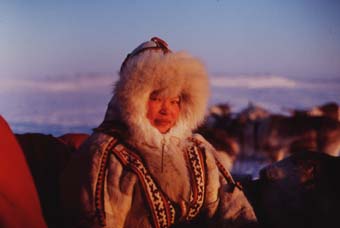
Sieben Lieder aus der Tundra /
Seven Songs from the Tundra
Markku Lehmuskallio/Anastasia Lapsui, Finnland 2000
Produktion/Weltvertrieb:
Jörn Donner Productions
Pohjoisranta 12, 00170 Helsinki, Finnland
Tel.: (358- 9) 135 60 60, Fax: 135 75 68
Buch: Anastasia Lapsui
Kamera: Johannes Lehmuskallio
Ton: Antero Honkanen, Pekka Martevo, Arto Jokisuu, Markku Lehmuskallio
Schnitt: Markku Lehmuskallio
Darsteller: Vitalina Hudi, Hatjako Yzangi, Gregory Anaguritsi, Nadeshda Wolodejewa, Nadeshda Horotetto.
Format: 35mm, 1:1.66, schwarzweiß
Länge: 85 Minuten, 24 Bilder/Sek.
Sprache: nenet, russisch
CinemaxX 3 11.02., 10.00
Delphi 11.02., 16.45
CineStar 8 12.02., 19.45
Arsenal 13.02., 14.45
Babylon 14.02., 21.30
Das erste und das siebte Lied sind dokumentarisch, die restlichen Teile sind inszeniert. Die Nenets haben keine Theater, keine professionellen Schauspieler, nur einfache Leute, Nomaden, Jäger und Fischer. Es war ihnen ein Bedürfnis, uns zu helfen. Sie stellten uns ihre Häuser, ihre Rentiere, Boote und vor allem sich selbst und ihre Zeit zu Verfügung. In unserem Film wird ein Nenet von einem Nenet gespielt, die Rolle des obersten Landwirts wurde vom obersten Landwirt übernommen, die des Lehrers von einem Lehrer; alle spielten sich selbst. Sie hatten den Eindruck, daß der Film die Geschichte ihrer Familien erzählt, ihre eigenen Geschichten. Dies ist der erste Spielfilm, der vollständig in der Sprache der Nenets gesprochen ist. Auch das Drehbuch wurde von einer gebürtigen Nenet geschrieben.
Markku Lehmuskallio
Anastasia Lapsui and I made several documentaries together in the 1990’s,
but there was always something missing, something that was left unsaid.
With documentaries, we have been prisoners of the moment. We figured that
a feature could express more, be richer, more free. We decided to make
one. Anastasia Lapsui wrote a number of legends and her own experiences
into stories – stories that describe the life of the Nenets and other
people in the region over a long period of time. We chose the ones that
would be reasonable to produce, and that’s how the screenplay for
Seven Songs From the Tundra came to be.
The first and seventh song are documentary and the rest have been dramatised.
The Nenets have no theatres, no professional actors, just common people,
nomads, hunters and fishers. They all had a strong desire to help us and
offer their homes, reindeer, boats and above all themselves and their
time to our film. In the film, a Nenets is played by a Nenets, the collective
farm boss by the collective farm boss, the teacher by a teacher, they
all appear as themselves. The people felt that the film was telling the
story of their families, the history of who they are. That is how the
anthology Seven Songs From the Tundra was born.
It is the first feature film in the Nenets language. And the screenplay
was also written by a native Nenets.
Markku Lehmuskallio
Markku Lehmuskallio, geb. 1938 in Finnland. Kurz- und Spielfilme seit 1974, Dokumentarfilme zusammen mit Anastasia Lapsui, einer gebürtigen Nenet, seit 1993 u.a. Paradise Lost (1994), Uhri – Elokuva metsästa (Forum 1999).